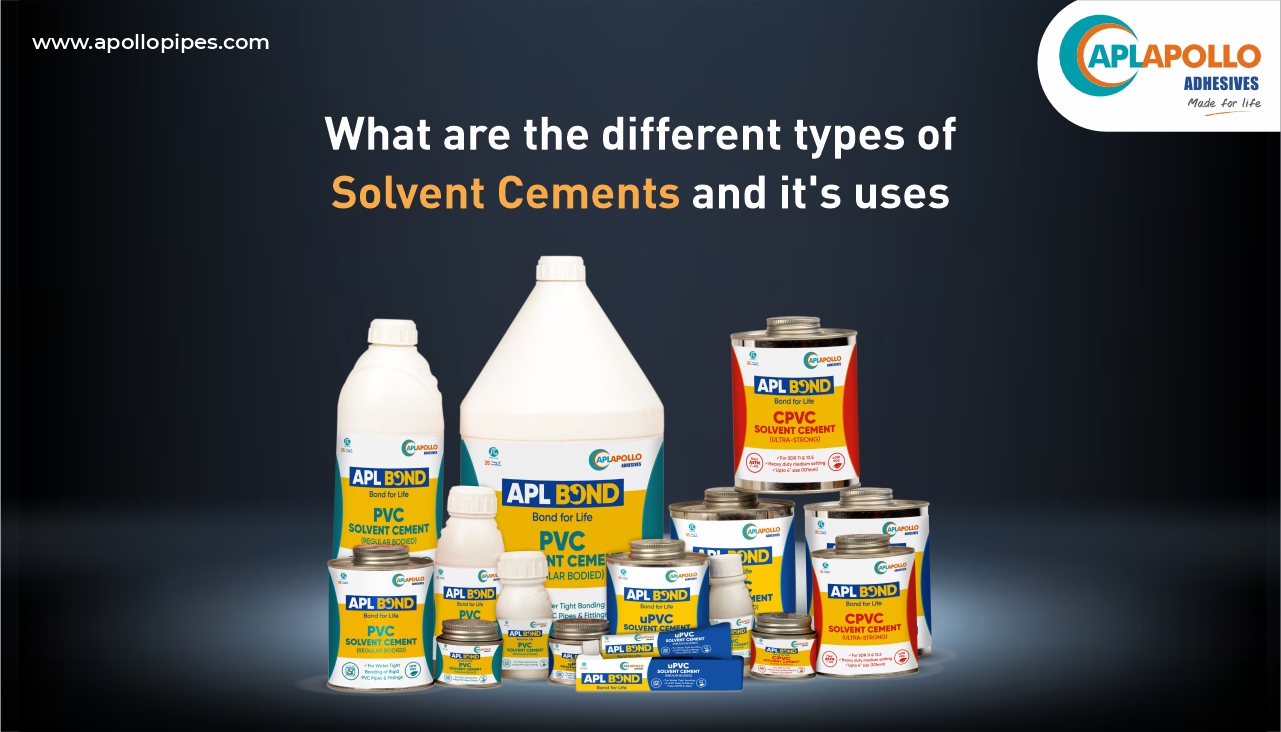Even the highest quality pipes are ineffective without secure joints, highlighting the essential role of solvent cement in plumbing. It creates a strong, leak-proof bond between pipes and fittings and builds a trustworthy piping system. Its importance is crucial for maintaining durability and efficiency in plumbing connections. These cements are widely used in plumbing, construction, and various industrial applications for joining pipes and fittings, especially for plastic-based materials like PVC, CPVC, and ABS.
These cements work by softening the surfaces of the materials being bonded, allowing them to fuse into a single, solid piece as the solvent evaporates. Different types of solvent cements are formulated to work with specific materials and applications, ensuring long-lasting, leak-proof bonds. Whether used in water supply lines, drainage systems, or industrial piping, solvent cements provide a versatile and efficient solution for connecting plastic pipes.
In this blog , we are discussing the most common types of solvent cements and their uses.
PVC Solvent Cement
Polyvinyl chloride (PVC) solvent cement is the most commonly used type of solvent cement, particularly in plumbing and construction. It is used to join PVC pipes and fittings by softening the surface of the plastic, allowing them to bond securely. PVC is a popular material for water distribution, drainage, and irrigation systems due to its strength, durability, and resistance to corrosion. This cement is widely used in plumbing for potable water lines in residential and commercial buildings. This cement is generally used for drain, waste, and vent systems. PVC pipes that are joined with solvent cement are used in agricultural irrigation and sprinkler systems. It is also used to join pipes that protect electrical wiring.
CPVC Solvent Cement
Chlorinated polyvinyl chloride (CPVC) solvent cement is specially formulated for CPVC pipes and fittings. CPVC is similar to PVC but has a higher chlorine content, making it more resistant to heat and chemical degradation. As a result, CPVC is often used in applications where higher temperatures are encountered, such as in hot water supply systems. CPVC solvent cement is widely used in hot water plumbing systems, where temperatures can reach up to 200°F. CPVC pipes joined with solvent cement are used in industrial processes that involve corrosive chemicals.
ABS Solvent Cement
It is also one of the solvent cements and is used for joining ABS pipes and fittings, which are known for their toughness and impact resistance. It is extensively used in construction for sewer and drainage systems. The main feature of this solvent cement is that it does not require a primer before applying solvent cement, making it a more convenient choice for certain applications. It is frequently used to join pipes in underground sewer and storm-water systems. ABS pipes joined with solvent cement are also used in ventilation and air conditioning systems.
Low-VOC Solvent Cement
Volatile organic compounds (VOCs) are harmful chemicals emitted by many traditional solvent cements. It is designed to minimize these emissions, making them more environmentally friendly and safer for indoor use. These cements are required by some building codes and regulations, particularly in areas with strict environmental standards. It is also often used in indoor plumbing applications where ventilation may be limited. It is used in projects that prioritize eco-friendly materials and practices, such as green building initiatives.
Specialty Solvent Cements
Some applications require the use of specialty solvent cements, which are formulated for specific types of plastic materials or unique conditions. For example, some solvent cements are designed to bond pipes that will be exposed to extreme temperatures, chemicals, or other harsh environments. This solvent cement is used in chemical processing plants where the pipes must withstand exposure to highly corrosive materials.
Heavy-Duty Solvent Cement
Heavy-duty solvent cements are formulated for use in high-pressure systems or applications that require extra-strong bonds. These cements are often thicker and more viscous than standard cements, allowing them to provide a more durable bond in challenging conditions. These are also used in industrial piping systems that handle high pressure liquids or gases. It is also used in commercial plumbing systems where durability and strength are critical, such as in large buildings or complexes. These cements are also used in heavy-duty drainage systems where the pipes may be subjected to high loads or pressure.
APL Bond Solvent Cement
APL Bond solvent cement is the ideal solution for bonding or joining pipes and fittings, as it reinforces the joints, making them durable and leak-proof. It is produced by using strict quality control standards. APL Bond solvent cement comes in three options namely CPVC, uPVC, and PVC. Known for its superior quality, APL Bond also offers fast-setting properties, ensuring quick and efficient application.


